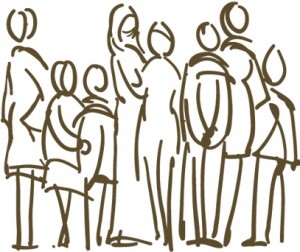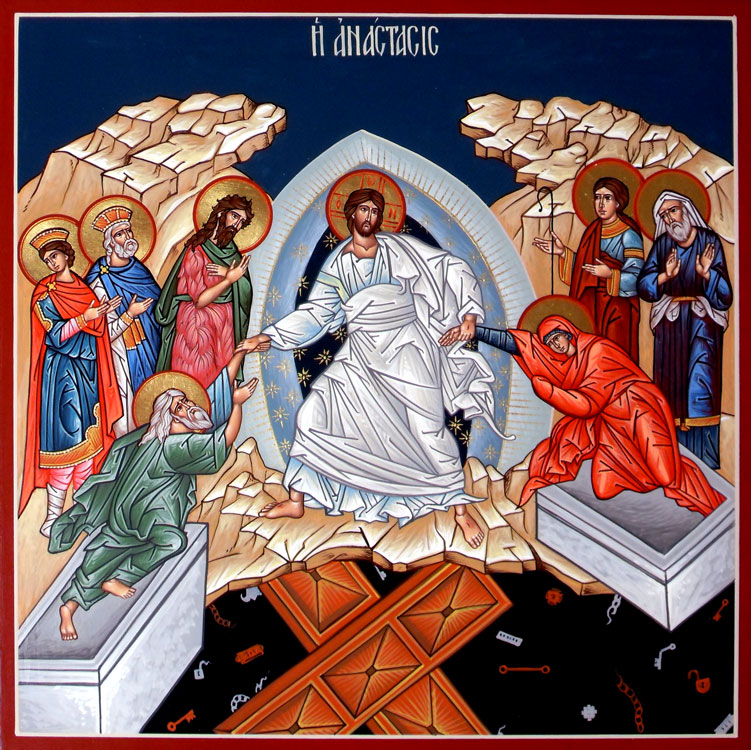====================
This sermon was preached on the Eighteenth Sunday after Pentecost, September 22, 2013, at St. Paul’s Episcopal Church, Medina, Ohio, where Fr. Funston is rector.
(Revised Common Lectionary, Pentecost 18 (Proper 20, Year C): Jeremiah 8:18-9:1; Psalm 79:1-9; 1 Timothy 2:1-7; and Luke 16:1-13. These lessons can be read at The Lectionary Page.)
====================
 As you know, we now have an Education for Ministry seminar group working in this parish. Eight of us began meeting two weeks ago and we will have our first working session tomorrow night. One of the things that EFM encourages students to do is explore their personal spiritual autobiographies using a variety of formats and tools, and then share as much of that autobiography with the seminar group as they are comfortable doing. Each of the four years begins with the sharing of spiritual autobiographies, and the seminar group’s mentor or facilitator is asked to lead off.
As you know, we now have an Education for Ministry seminar group working in this parish. Eight of us began meeting two weeks ago and we will have our first working session tomorrow night. One of the things that EFM encourages students to do is explore their personal spiritual autobiographies using a variety of formats and tools, and then share as much of that autobiography with the seminar group as they are comfortable doing. Each of the four years begins with the sharing of spiritual autobiographies, and the seminar group’s mentor or facilitator is asked to lead off.
So in addition to reading and re-reading these scriptures this past week, I’ve also been reviewing my life. The theme for EFM spiritual autobiographies this year is “Living Faithfully in Your World” and we are asked to consider a number of “worlds” or “contexts” in which we live, one of which is (obviously) family. We are asked, “Who are the people of importance in that world?” and “What events do you remember?” and “What stands out for you as you remember moving through different stages of your life?”
I don’t intend to give you this morning the spiritual autobiography that I will be sharing with the EFM group tomorrow, but as I read Jesus telling the Parable of the Manager that Luke relates in today’s Gospel lesson, I realized that money has played an interesting role in my personal spiritual development. So, if I may, I’d like to share with you three stories from my life which have impacted my understanding of what money is because that has direct bearing on what I understand Jesus to be saying in this story.
The first story has to do with my father’s death when I was 5-1/2 years old. The death of a parent, as you either know through personal experience and can pretty accurately imagine, is a real world-changing event for anyone. In my life it meant an almost complete change of lifestyle because, although my father was a very successful accountant in Las Vegas, Nevada, he was, apparently, not very good at managing his own accounts. My mother discovered that he was so heavily in debt that there was, quite literally, nothing in his estate. She had to sell our home and move us into an inexpensive two-bedroom apartment which she could only afford by taking in a lodger. She and I shared one bedroom, and another woman (who provided childcare when necessary, in exchange for reduced rent) took the other. She had to sell her car (a Cadillac Coupe de Ville my father had given her) and buy a used Nash Rambler stationwagon. As a WW2 veteran, my father was covered by a $10,000 life insurance policy, the proceeds of which paid for his funeral and the lawyer’s fee for handling his estate and settling his debts. My mother (and thus her children, my brother and I) inherited nothing from my father.
But my mother was an incredibly resourceful and talented woman who went to work, supported her children, saved and invested, and in a few years time was doing quite well for herself. She remarried, and she and my step-father purchased several homes over the years, amassed a reasonable amount of wealth, and lived comfortably.
The second story is that in 1971, my maternal grandmother, a widow, suffered a stroke and my mother and step-father invited her and my bachelor uncle who lived with her to live with them. Two years later, Grammy suffered a second, massive stroke and passed away. Shortly before her death, she advised my mother that she, my mother, had demonstrated that she could take care of herself so my grandmother had decided to leave all of her estate (which included my late grandfather’s, as well) to my uncle . . . my uncle who did not work, had never worked (although fully capable of doing so), and had never contributed the upkeep or expenses of the household. My mother’s reward for pulling herself and her children up out of poverty was to be disinherited.
The third story happened a decade later when my widowed paternal grandmother died. This happened while I was in law school. Evelyn and I were married by then, and she and I together with my mother and step-father, my brother and my sister-in-law, all traveled to Denver for her funeral and for the reading of her will. As it turned out, she (on instructions of my late grandfather which she felt unable to disobey even after he died) had also disinherited our family because my grandparents way back in 1940 had disapproved of my parents’ marriage. Never mind that there had been grandchildren who (in the case of my brother) had lived with our grandparents for six years while in high school and junior college, or who (in my own case) had spent nearly every summer for ten years with them. Those things didn’t matter. We were disinherited. Since the day my grandmother’s will was read, no one from my side of the family has had any contact with my aunt (who received the entire estate) or any of my cousins.
What I believe about money as a result of these three events is this: Money is an incredibly powerful symbol. It can be used to create and sustain relationships, or it can be used to destroy them. It can be used to help others, or it can be used to wound and hurt them. But money, in and of itself, has no intrinsic meaning or value. Think for a moment, to what do we assign value? Our money is nothing more than bits of paper and scraps of metal which are of far less actual value than we say they represent. Do we value gold or silver? When you get right down to it, they are nothing more than rocks. Do we value our homes? They are only brick and wood and mortar. Our Car? Our boat? Our books? Our clothing? Our other possessions? These are the things that our opening collect this morning describes as “things that are passing away.” Giving value to these sorts of things, and there many things we treasure, is giving value to that which in reality has no value.
There is an ancient term for giving value to that which has no value; it is called idolatry. It was the idolatry of the ancient Jews that caused Jeremiah to cry out on God’s behalf, “My joy is gone, grief is upon me, my heart is sick.” Giving value to that which has no value had hurt God’s “poor people,” so God mourned and was dismayed. Through the prophet God asks, “Is there no balm in Gilead? Is there no physician there?”
What is the remedy for idolatry? What treatment is there for giving value to that which has no value?
This is what today’s Gospel lesson answers. I’m sure you’ve heard this parable before; I know that many of you have read it in Bible study groups; you’ve probably heard other sermons about it. And you’ve probably been as stumped by it as are all the scholars and commentators and preachers who’ve ever dealt with it. I’m stumped by it. One of the things I’ve often wondered about it, as perhaps you have, is “Who is God in this parable?” and “Who am I in this parable?” Is God the master? Is God the manager? Is God one of the debtors? Who is God? And who are we?
Reading this parable this week in the context of doing my EFM spiritual autobiography and remembering those three events of death and inheritance, I came to the realization that those are the wrong questions! Parables aren’t necessarily allegories of God-and-me, and this one especially so. God isn’t in this parable; we might be but God certainly is not! If we want to make sense of the parables we have to read them in context. We have to consider where they appear in the narrative. Matthew, Mark, Luke, and John weren’t just compiling collections of things Jesus said without regard to when and where and to whom and why they were said. The gospel writers were authors of narratives and we have to look at the whole narrative, not just a little piece lifted out of its context.
This parable only makes sense if we take note of who was listening to it in Luke’s larger story: some disciples, some tax collectors, and some scoffing, sniping scribes and Pharisees whom Luke describes as “lovers of money, [who] heard all this, and . . . ridiculed [Jesus].” (v. 14) Immediately before telling this tale, Jesus has told the two tales of loss (a lost sheep and a lost coin) that we heard last week, and the tale we call “the story of the Prodigal Son.” Immediately after telling this tale, Jesus reminds the scoffing Pharisees that “what is prized by human beings is an abomination in the sight of God,” (v. 15) and proceeds to tell them the story of Lazarus and the rich man. Luke, as the gospel writer, positions this parable told to lovers of money in the middle of a series of stories about possessions and wealth.
This is not a story about God! It’s a story about money! It’s a story about what Jesus calls (in the original Greek) tou mamona te adikia, “the mammon of unrighteousness,” translated in our New Revised Version reading as “dishonest wealth.”
What do you suppose he means by such a term?
Preacher and author John Ortberg tells a story about the first nice piece of furniture he and his wife bought back in the 1980s. At the time they had three children ages four, two, and six-months. Because of its color, the new sofa became known as “the mauve sofa.” This nice new sofa replaced an old couch they had called the “yaya couch” because Ortberg would play a game with the kids bounce on the couch as they called out together “Yaya!”
Well, you know what happened when they replaced the old yaya couch with the new mauve sofa. Suddenly new rules went into effect. “Do not eat on the mauve sofa. Do not bounce on the mauve sofa. Do not play on the mauve sofa. Do not sit on the mauve sofa. Do not even breathe near the mauve sofa. You may play and sit on the rest of the furniture, but on the day you do anything to the mauve sofa you shall surely die!”
One day, Ortberg’s wife found a red stain on the mauve sofa. The family was assembled. “Children,” said Mom, “look at this stain. This red stain will not come out! Now we are going to stay here until someone tells me who spilled something red on this sofa.” The wide-eyed and fearful children stood silently: no one confessed. They knew it meant death to the culprit.
Ortberg finishes his story saying, “Now that was many years ago. I still remember the old yaya couch and the mauve sofa. I have many happy memories of that yaya couch, bouncing the children, wrestling and playing together. The only memory I have of the mauve sofa was the day I ate a jelly donut on it and spilled the filling.”
Let’s be honest. Wealth changes things, and it changes us. Wealth, as Jesus said, is dishonest, and frankly it makes us dishonest.
A few months ago, Time Magazine ran an article entitled How Money Makes You Lie and Cheat. It reported on a study undertaken by some Harvard and University of Utah professors of business ethics. “[Three hundred] students were randomly assigned to think about either money or about nothing in particular by descrambling sentences; the money-related sentences included phrases such as ‘She spends money liberally’ while those unrelated to cash included ‘She walked on grass.’” In follow-up tests, “those who reconstructed the money-related sentences were far more likely to say they would do things like steal a ream of paper from the office copy machine than those who worked with the unrelated sentences. [and] Students cued to consider money told twice as many lies.”
The lead researcher commented that “small and unnoticeable reminders of money can produce lying, cheating, and essentially stealing 10 minutes later,” and that “[Money cues] trigger . . . decision [making through] a cost/benefit analysis and the significance is that we’re not considering other things like moral issues.” In the report of the study itself, the researchers conclude that “the mere presence of money, an often taken-for-granted and easily overlooked feature of our daily lives, can serve as a prompt for immoral behavior.” (Science Direct)
This is what Jesus is talking about when he asks, “If then you have not been faithful with the dishonest wealth, who will entrust to you the true riches?” This is why he draws a distinction between “dishonest wealth” and “true riches,” and why he tells us, “You cannot serve God and wealth.” True riches are our relationships — with our parents and our children, with our grandparents and our grandchildren, with our spouses, with our friends, with everyone around us, with God; these are what our opening collect describes as “things heavenly,” the things that shall endure, to which we hope to hold fast. And relationships that are affected by, possibly disrupted by, maybe even destroyed by money and what we do with it. Jesus encourages us, as a remedy for idolatry, to learn from the “children of this age.” What he encourages us to learn is to “make friends for ourselves” by means of the “dishonest wealth” so that those new friends might “welcome us into the eternal homes.” Instead of using “dishonest wealth” in ways that break relationship or exploit others, we are to use money to form relationships. Like the manager in the story, we are to form friendships that are reciprocal and egalitarian, relationships that release people from debt, relationships that enrich the lives of those within them. These are the true riches.
When my mother and my step-father made their estate plan, they insisted that their wealth be shared equally among their children and their children’s children. My brother and his family, my step-sister and her family, me and my family — we were treated equally and we received equal shares, because what mattered was not the wealth; what mattered was the relationship.
In telling the Parable of the Manager, Jesus is not teaching about God; Jesus is teaching about money and about us. We are, all of us, managers of wealth entrusted to us by God. We have been entrusted with wealth and, like the manager in the story, we must decide what are we going to use it for. The love of things, of money, of possessions? Do we treat that with which we’ve been entrusted as if we owned it ourselves? Or do we use it for God’s purposes, to create relationships and to sustain community? In the end it’s not a story about business ethics, but about a deeper level of motivation: what do I care about? What do I really care about? What true riches do I really care about?
There is a balm in Gilead. There is a remedy for idolatry. There is a treatment for giving value to that which has no value. The health of God’s poor people is restored by friendship, by relationship, by the true riches of community.
Let us pray:
Almighty God, whose loving hand has given us all that we possess: Grant us grace that we may honor you with our wealth and possessions, and, remembering the account which we must one day give, may be faithful stewards of your bounty, through Jesus Christ our Lord. Amen. (Adapted from The Book of Common Prayer, 1979, p. 827)
====================
A request to my readers: I’m trying to build the readership of this blog and I’d very much appreciate your help in doing so. If you find something here that is of value, please share it with others. If you are on Facebook, “like” the posts on your page so others can see them. If you are following me on Twitter, please “retweet” the notices of these meditations. If you have a blog of your own, please include mine in your links (a favor I will gladly reciprocate). Many thanks!
====================
Father Funston is the rector of St. Paul’s Episcopal Church, Medina, Ohio.
 Can the finite ever truly know the infinite? Can the human mind ever fully grasp the knowledge of God? We have the assurance of Jeremiah’s prophecy, the consolation of God spoken through “the weeping prophet” that it can. And Jeremiah is not alone.
Can the finite ever truly know the infinite? Can the human mind ever fully grasp the knowledge of God? We have the assurance of Jeremiah’s prophecy, the consolation of God spoken through “the weeping prophet” that it can. And Jeremiah is not alone. Several days ago, as I was reading again the Easter story and the sections of the Holy Scriptures appointed for this year, I had the radio on and tuned to my favorite oldies station.
Several days ago, as I was reading again the Easter story and the sections of the Holy Scriptures appointed for this year, I had the radio on and tuned to my favorite oldies station. In the Eastern Orthodox tradition, icons of the Resurrection depict Christ rising from the tomb with a whole crowd of people. To one side of him crowned and haloed are King David and King Solomon; on the other, we see Abel the first martyr of creation carrying a shepherd’s crook and Moses the first prophet of the Old Covenant. Also present is John the Baptist, who is both the first prophet and the first martyr of the New Covenant. Beneath Christ’s feet, the gates of hell lie broken, often forming a cross. And from two tombs, Adam and Eve are rising, but not of their own accord; Jesus holds them by the wrists and is pulling them from their graves.
In the Eastern Orthodox tradition, icons of the Resurrection depict Christ rising from the tomb with a whole crowd of people. To one side of him crowned and haloed are King David and King Solomon; on the other, we see Abel the first martyr of creation carrying a shepherd’s crook and Moses the first prophet of the Old Covenant. Also present is John the Baptist, who is both the first prophet and the first martyr of the New Covenant. Beneath Christ’s feet, the gates of hell lie broken, often forming a cross. And from two tombs, Adam and Eve are rising, but not of their own accord; Jesus holds them by the wrists and is pulling them from their graves.  Last evening while driving home from the midweek Eucharist, I listened to a program on the local NPR station in which the host and a guest were discussing the internet coverage of news. One of the things mentioned was that the analytics on a British tabloid’s website had demonstrated that a story about Taylor Swift’s legs had garnered more “clicks” and more viewing time than a simultaneously run story about the world-wide affects of global climate change – something on the order of 400% more! The discussion continued with similar examples of stories about Kim Kardashian and her “rear end,” Justin Bieber’s legal problems, and more.
Last evening while driving home from the midweek Eucharist, I listened to a program on the local NPR station in which the host and a guest were discussing the internet coverage of news. One of the things mentioned was that the analytics on a British tabloid’s website had demonstrated that a story about Taylor Swift’s legs had garnered more “clicks” and more viewing time than a simultaneously run story about the world-wide affects of global climate change – something on the order of 400% more! The discussion continued with similar examples of stories about Kim Kardashian and her “rear end,” Justin Bieber’s legal problems, and more. Very recently in the church office mail there was this small envelope addressed to me personally — the address has been typed out on a separate sheet of paper, cut therefrom, and glued onto the envelope. There is no return address and the postmark is a Cleveland, OH, cancelation. Inside there was no personal note of any kind, just a page torn from the last quarter’s Forward Day by Day devotional. One side, as you can see, has been scribbled all over; clearly not the side I am supposed to read. The other is the meditation for October 30, 2013, which begins:
Very recently in the church office mail there was this small envelope addressed to me personally — the address has been typed out on a separate sheet of paper, cut therefrom, and glued onto the envelope. There is no return address and the postmark is a Cleveland, OH, cancelation. Inside there was no personal note of any kind, just a page torn from the last quarter’s Forward Day by Day devotional. One side, as you can see, has been scribbled all over; clearly not the side I am supposed to read. The other is the meditation for October 30, 2013, which begins: “The days are surely coming, says the Lord, when I will . . . watch over [the house of Israel and the house of Judah] to build and to plant. * * * I will put my law within them, and I will write it on their hearts; and I will be their God, and they shall be my people.”
“The days are surely coming, says the Lord, when I will . . . watch over [the house of Israel and the house of Judah] to build and to plant. * * * I will put my law within them, and I will write it on their hearts; and I will be their God, and they shall be my people.” How do we maintain our established convictions and carry our old confessions into new, uncertain, and sometimes unsettling circumstances? It’s an unavoidable question, one which we answer all the time, even if we aren’t aware that we are doing so. It is the question to which both our Old Testament lesson and our reading from the Pastoral Epistles offer answers and, interestingly but not surprisingly (this is, after all, the Bible), the answers are contradictory.
How do we maintain our established convictions and carry our old confessions into new, uncertain, and sometimes unsettling circumstances? It’s an unavoidable question, one which we answer all the time, even if we aren’t aware that we are doing so. It is the question to which both our Old Testament lesson and our reading from the Pastoral Epistles offer answers and, interestingly but not surprisingly (this is, after all, the Bible), the answers are contradictory. As you know, we now have an Education for Ministry seminar group working in this parish. Eight of us began meeting two weeks ago and we will have our first working session tomorrow night. One of the things that EFM encourages students to do is explore their personal spiritual autobiographies using a variety of formats and tools, and then share as much of that autobiography with the seminar group as they are comfortable doing. Each of the four years begins with the sharing of spiritual autobiographies, and the seminar group’s mentor or facilitator is asked to lead off.
As you know, we now have an Education for Ministry seminar group working in this parish. Eight of us began meeting two weeks ago and we will have our first working session tomorrow night. One of the things that EFM encourages students to do is explore their personal spiritual autobiographies using a variety of formats and tools, and then share as much of that autobiography with the seminar group as they are comfortable doing. Each of the four years begins with the sharing of spiritual autobiographies, and the seminar group’s mentor or facilitator is asked to lead off. We are given three very challenging readings from Holy Scripture this morning. First, there is Jeremiah’s familiar, but radical, prophetic metaphor of God as a potter able to do with the nation of Israel what a potter does with a spoiled piece of work. Second, perhaps the oddest piece of New Testament literature, Paul’s personal letter to a man named Philemon returning a runaway slave whom Paul has converted to Christianity. And, lastly, Luke’s report of Jesus’ radical requirement that his followers must hate their possessions, their families, and even themselves. What I believe is common among these lessons is a call to radical transformation.
We are given three very challenging readings from Holy Scripture this morning. First, there is Jeremiah’s familiar, but radical, prophetic metaphor of God as a potter able to do with the nation of Israel what a potter does with a spoiled piece of work. Second, perhaps the oddest piece of New Testament literature, Paul’s personal letter to a man named Philemon returning a runaway slave whom Paul has converted to Christianity. And, lastly, Luke’s report of Jesus’ radical requirement that his followers must hate their possessions, their families, and even themselves. What I believe is common among these lessons is a call to radical transformation. Finish this verse: “The Lord helps those . . . .”
Finish this verse: “The Lord helps those . . . .”

